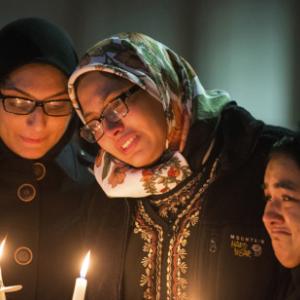Anna Bigelow is associate professor of Islamic studies at N.C. State University in Raleigh, N.C.
Posts By This Author
What the Chapel Hill Murders Reveal About the Place of Muslims in American Society
RALEIGH, N.C. — Deah Barakat took my class “Islam in the Modern World” at N.C. State University a few years ago. He was curious about Islamic history, contemporary spiritual and political movements, and was great in class discussions. I’ve taught thousands of students in the last 11 years here, but Deah stood out for his enthusiasm, kindness, calm demeanor and obvious charisma.
Deah Barakat, Yusor Abu-Salha, and Razan Abu-Salha were the very best people. They embodied the core Islamic principle of “ihsan” — doing that which is both beautiful in itself and beautifying to the world. They volunteered to assist poor and homeless people. They planned to travel to camps in Turkey to help Syrian refugees in need. They were creative, intelligent, kind, generous. There are no words for how much we have all lost when they were gunned down and murdered in their Chapel Hill condominium last week.
Yet many insist their murders resulted from a dispute over parking. While the particular motives of the shooter cannot be determined at this stage, it is abundantly clear that these deaths were not just about parking. It is also clear the emerging discussion is about the place of Muslims in contemporary America. As we analyze the meaning of Deah, Yusor, and Razan’s murders, we are also peeling back layers of societal debates about Islam, Muslim-Americans, and the culture of intolerance and violence taking root in the U.S. On some level, it does not matter whether the shooter actually intended to kill three Muslims because they were Muslim. The public conversation is revealing several collective concerns in stark and disturbing ways.
